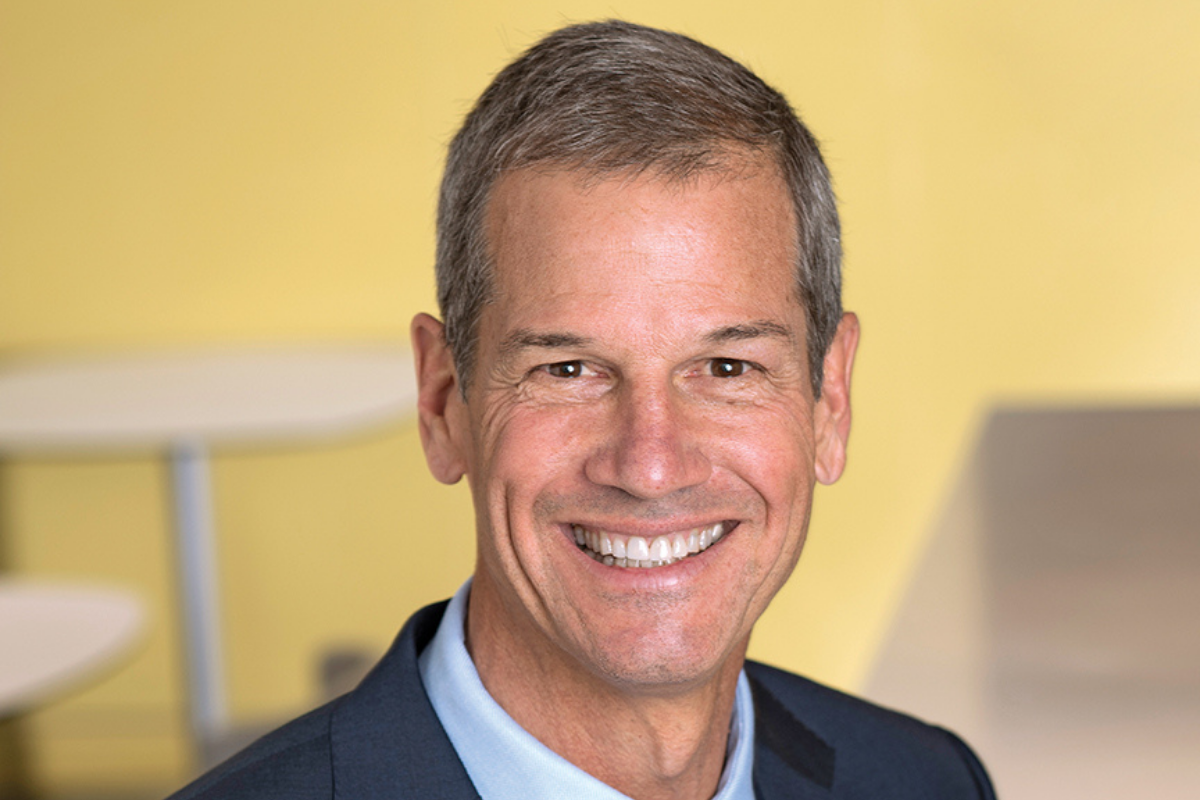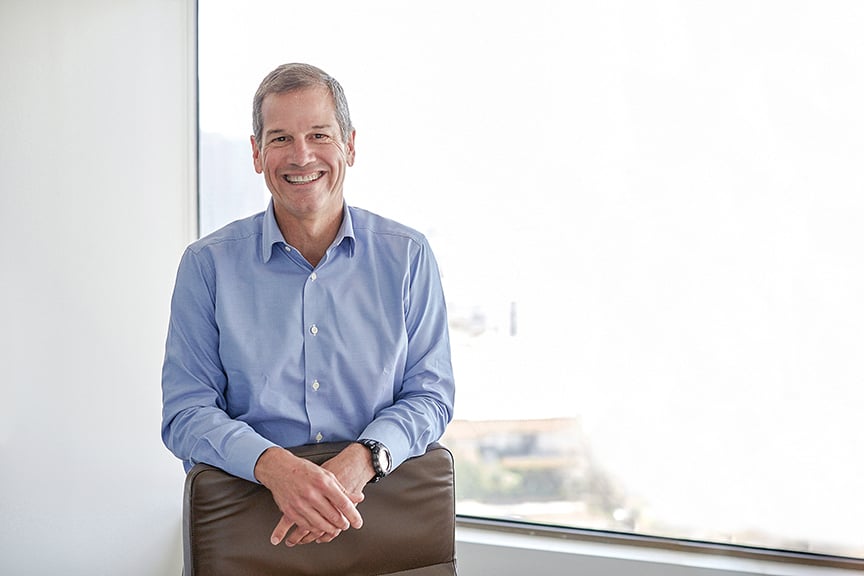The last place Rick Newman wanted to end up was in his father’s shadow. Fresh out of Stanford and MIT with a Master of Science degree, the obvious choice for Rick was to join AECOM, the global construction and engineering services giant his father, Richard (Dick) Newman, launched in 1990. Instead, he struck out on his own, rising over a 30-year career to become CEO of Lowe Real Estate.

“After my education, I wanted to make my own path and add my own value,” he recalls. Throughout high school and college, Rick held a series of jobs working on residential and commercial construction sites.
“At one point, I was installing solar panels on apartment buildings,” he says. Reflecting on his move from Lowe, Rick comments, “After so long, I had no intention of leaving Lowe. It was a difficult decision as I was fortunate to have Bob Lowe as my first business mentor and have my friends Rob and Mike Lowe as my partners. But in early 2017, my father had started Global Infrastructure Solutions or GISI.”
Now 86 years young, the senior Newman retired from AECOM in 2015 with a concept in mind for an organization made up of strategic leaders from the engineering and construction industry, and being a global, privately owned company.
GISI offers successful companies that desire an ownership transition or more opportunity to grow, the access to capital, expertise, and global relationships as an alternative to private equity or strategic consolidators.
From prior experience, the former AECOM leadership want to replicate the employee-ownership model but do not believe being publicly traded is a necessary or favorable capital structure.
They are committed to long-term private ownership emphasizing the preservation of company legacies with the opportunity for their leadership to gain value, not just at the time of the merger but together with GISI in the future.
“It was a different type of management and ownership model that Dick knew could and would be successful. It fit well with E&C companies, which should be planning and adding value over years, not quarter to quarter,” Rick says.
Along with contemporaries – former AECOM CEO andChair John Dionisio and Jeff Kissel, former CFO of one of the companies that merged with AECOM – Dick founded Global Infrastructure Solutions Inc. (GISI). Today, GISI is the parent of a diversified family of E&C firms “with a business model where we look for solid companies with good management teams, good reputations and a good client base, and merge with them,” John told Engineering News-Record in September 2020.
Culture can be unique, but in the GISI family, our values must be aligned.
The first company’s management team to merge with GISI was global construction management leader Structure Tone, then operating a family of companies most active in the northeast including other brands LF Driscoll, Pavarini, and Pavarini McGovern.
Over the past four years, additional GISI mergers with Govan Brown, Ajax, Abbott, BCCI and Layton now form the STO Building Group, a construction services platform under the GISI umbrella.
“In each case, we strengthened our management team, starting with our initial partners at STO Building Group Jim Donaghy, its Executive Chair, CEO Bob Mullen and their management team, to our largest subsequent merger in construction services with David Layton, CEO of Layton Construction and his team,” Rick says.
In 2017, Structure Tone’s business was over three-quarters in the northeast US. “Today, through our merger activity as well as strong organic growth, STO Building Group is a more diversified and national business with less than 40% of its business in the northeast,” Rick says.
Structure Tone’s second-generation leadership and its Founders Pat Donaghy and John White wanted an ownership transition where employees and clients would be well cared for by a team with the same culture and values that established the company as an industry leader.
Jim Donaghy and Bob Mullen embraced the employee ownership concept and culture offered by Dick and his team. “GISI empowered our people, took genuine interest in our legacy and provided meaningful investment in our vision,” Jim Donaghy said at the time.
“The newly incorporated companies’ management teams became our partners,” Rick says. “They retained their name and leadership roles but are now able to access the consolidated wealth and resources of GISI.
“Some other types of businesses may not mind if the name or brand changes,” he continues. “However, particularly in the engineering and construction services business, it is very different, as the name on the hard hat matters and there’s long-term, multi-generational value in their brands.”
Rick emphasizes that GISI’s focus is not on the number of brands in its orbit. “Our focus is on our partner companies’ leadership and how they build their talent, create value for their clients and in turn their individual brands,” he says.

“That’s core to us. It’s more common for other companies to combine and consolidate brands, but we feel there’s a lot of pride in people who have multi-generational brands, as well as the culture they’ve created. Key to what we’re trying to do is preserve, support and help grow their legacies.”
Legacy also played a crucial role in Rick’s decision to join GISI beyond his initial involvement at the board level. “There were two catalysts that led me to take on the role I have at GISI,” he says.
“The first was very personal; in late 2016, I lost my wife Lori to cancer after a 13-year battle. She was very clear as she was passing that I should continue to push myself to grow and take on new challenges in life.”
A year later, the GISI Board discussed management succession with Rick. “I’d truly thought I’d finish my career with Lowe. Instead, I made a move I never thought I would,” he admits. In April 2018, Rick moved into the role of President at GISI, surrounded by industry legends he’d grown up hearing about across the kitchen table.
“Our Vice Chair John Dionisio, Tony Shum leading our efforts in Asia, and CFO Jeff Kissel – to have them as partners and mentors is a unique opportunity,” he says. “Obviously, the icing on the cake is I also get to work with my father.”
Rick’s longtime resistance to the idea of working with his father eventually worked in his favor. “It’s very different to work with him at this age, at this stage of life,” Rick concedes.
“Having been a CEO at Lowe, I could really bring to the table a different level of skill and knowledge. It’s a pleasure to be able to think through problems and opportunities with him and the other former industry CEOs.”
As GISI adds more brands to its platforms, diversification of expertise and services plays a larger role in its merger criteria, Rick says. Diversification was a primary consideration in GISI’s most recent major partnership with New York design firm and construction manager LiRo Group. “LiRo is the first engineering and consulting group we’ve added,” he says.
“When we added Rocco Trotta and his management team they further diversified our total family of companies in a significant way, and we continue to look to strengthen our leadership team and diversification as we proactively consider additional merger partners to build our engineering and consulting group.”
GISI does not trade in acquisitions, Rick says. “We don’t view any of our partnerships to be acquisitions,” he insists. “Nobody wishes to be acquired and we don’t want to be buying assets. We are merging, adding new leadership to GISI. We’re long-term partners together. It’s establishing that relationship together, that we’re a team. We each have different primary roles, and we complement each other as we work together.”
The search for potential partners extends beyond borders, both literal and cultural. “While we look for firms that share the same values, cultures may differ,” Rick says.

“Certainly, the cultural background of a partner that grew up in New York and one in Singapore will have different experiences, ways to approach opportunities, and have different firm cultures. But with our values aligned, we and our clients benefit from these diverse backgrounds and experiences.
“It’s also then the people and the leadership – specifically, leadership – that wishes to enhance and grow their enterprise and build upon their own successes with us collectively that attracts us. Those are the keys.”
When GISI teamed with Structure Tone in early 2017, it found some differentiators and competitive advantage. “There are certainly a number of different firms that are consolidators or investors within the construction, engineering and consulting space,” Rick says.
“But we feel over the long-term we will be recognized as having a unique model of choice. We have the knowledge and relationships of strategic consolidators but have no interest in operating our partners’ businesses and are committed to long-term opportunity and growth for them as we preserve their brands and legacies. We also have access to capital like financial investor groups, albeit without extensive leverage and with a commitment to multi-generational employee ownership.”
GISI’s distinctive employee-ownership model ensures all shareholders own the same class of shares as GISI founders. “You act like an owner when you are one,” Rick says of the power of employee ownership.
“We all own the same shares, all of us.” Employees can buy shares directly or through payroll deductions. To encourage ownership, GISI matches each employee’s purchase, Rick adds. “Also, our compensation systems utilize equity for both management and employees, so we can all build ownership over time.”
The model has been well received on many levels, he says. “Our shares have done very well since their inception; the results have been terrific. From onsite team members to the management level, our employees have embraced being owners and understand the opportunity for personal and professional growth that it presents for them.”
One merger partner, Layton Construction, joined the GISI family in part to expand employee ownership, which could not be done without merging.
“Even as an impetus for a merger transaction, employee ownership is a key advantage we’re seeing in the marketplace,” Rick says, adding that the end product is an assemblage of partner companies working toward the same goal, albeit in different families.
“We’re all owners in the same company, but operationally we have many different companies.” GISI’s construction services group, the STO Building Group, consists of 12 companies located throughout the US, Canada, Ireland and the UK. “Those companies are collectively part of the STO Building Group family name, which they may or may not ever use within their marketplace,” Rick says.
“They operate with their own brand name, but as they need the incremental support, cross-selling or other elements, they may use the STO or other partners’ brands.” With the LiRo merger, GISI has broken the seal on its consulting services family.
It’s the overall team result that counts, but it’s a blessing and a pleasure to work with and learn from my dad and other icons of our industry.
“It’s a family of one right now, but it’s part of our strategy to develop a parallel group to complement the construction services business,” Rick says.
The platform will offer professional services such as project management-for-a-fee with a primary focus on public and institutional markets, although including private clients as well. Project management is an ideal fit for GISI, Rick believes, because it’s inherently suited to the employee-ownership model.
“While it works in many, many different industries, I think each employee on a project management team really does have value to add. They know as they create value for our clients, it is directly connected to the company’s total value proposition and share value; I think that’s a terrific alignment.”
Once that alignment is complete, GISI and its partners develop a day-to-day working relationship that benefits the group’s common goals as well as those of the individual brands. It’s a collaborative process that begins with the merger, Rick says.
“The work we do together is everything from problem-solving to strategic planning,” he adds. “Both management teams work to develop and implement strategies, and we try to make sure we’re focused on where we as a parent are adding value. They focus primarily on the operations, driving value for our clients, and the strategy for their business.”

Rick says GISI strives to provide an overall strategy and open new service lines and geography, rather than impeding how its brands do business.
“They are focused on our employees, clients and projects, and we on the capital structure, equity plans, working with our lenders and shareholders, looking for opportunities where we can help them grow acquisitively or organically through our knowledge and relationships and driving the synergies among our entire family of companies.”
If it sounds like a smooth, clearly delineated process, that’s by design. “It’s part of our commitment that we’re not looking to run this as one firm,” Rick says. “We really wish people to continue functioning as they did pre-merger.”
GISI’s growth has been driven by its culture of mutual respect and trust, and an unwavering commitment to keeping core values aligned. “Just as you’d have in a family,” Rick says, in a nod to his own family connection.
“It’s an everlasting cultural foundation, but I’d also say key is our core values. Culture can be unique, but in the GISI family, our values must be aligned, particularly that platinum rule of mutual respect and trust with each other. We started as a business with revenues of about US$3.5 billion; we’re now at more than US$8.5 billion. I’m proud of that success, and it’s shown incredible growth for our shareholders, already including more than half of our employees.”
Success for GISI includes a strong return for all its shareholders, who to date have received more than a 20% annual return including an annual dividend.
“The importance of a dividend is that our employee shareholders can then go home to their families and show them, ‘Look, here’s our annual cash share on our investment in my company,’” he says.
From hesitant beginnings, Rick embraced the opportunity to work with his father in a company that has by its very design become a family to many – and one that is growing year by year. “It’s the overall team result that counts,” he says.
“But it’s a blessing and a pleasure to work with and learn from my dad and other icons of our industry. Especially amid COVID-19, I’ve learned more and more to appreciate just having time with people. It has been wonderful being able to balance our perspectives and views of what is the right strategy as we manage the business, but also just our time together. It’s something you can’t underestimate.”


